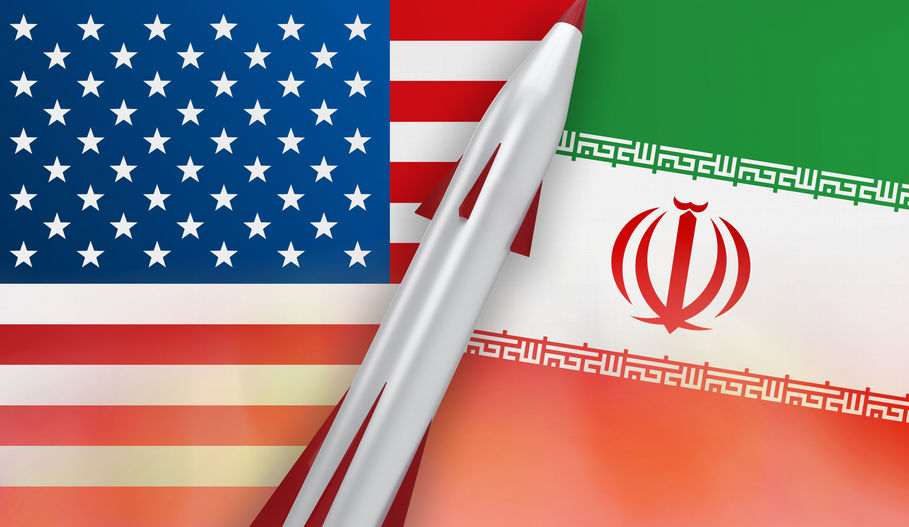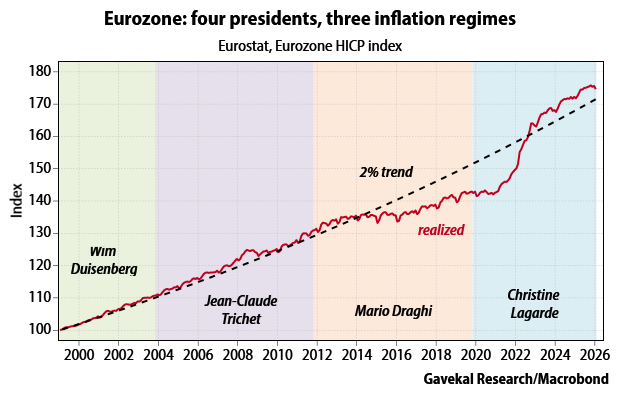Most recent

Gavekal Research

Does Iran Change The Investment Environment?
Louis-Vincent Gave
2 Mar 2026
So far this year, all the ingredients seemed to be in place for an epic inflationary boom. Now, suddenly the events in the Persian Gulf raise the threat of a meaningful surge in energy prices and a consequent shift from inflationary boom to inflationary bust. Louis assesses what this means for asset allocators.

Gavekal Research

The Renminbification Of Hong Kong
Louis-Vincent Gave
27 Feb 2026
Chinese president Xi Jinping wants the renminbi to “attain reserve currency status.” At first this looks like an impossible ask; China still operates capital controls, and the pool of renminbi assets readily available in international markets for foreign reserve managers to purchase is limited. In this report, Louis looks at how Hong Kong’s financial system could provide a crucial workaround.
Gavekal Research

Chinese Consumers Perk Up A Little
Ernan Cui
27 Feb 2026
China’s domestic demand may be generally lackluster, but there is one area of notable recent improvement: household consumption growth started to accelerate in late 2025. Ernan argues that the latest slate of travel and spending data from the lunar new year public holiday, which ran from February 15 to 23, provides some further evidence of a gradual pickup.
Gavekal Research

Webinar: China Sets The Agenda
Christopher Beddor, Wei He, Ernan Cui, Thomas Gatley
27 Feb 2026
At the beginning of March, China’s government will announce its economic agenda and budget for 2026, as well as its next five-year plan. The leadership is sounding confident, with some reason, but there are many questions on policy. Exports are booming and industrial upgrading is proceeding, but the anti-involution campaign is scrambling incentives. Fiscal and monetary stimulus is cautious, even though growth has been slowing. Officials are talking up their plans to boost consumption, but household sentiment is still weak. In this webinar, our China team assess these and other issues, and explain what to expect from China macro and markets in 2026.
Gavekal Dragonomics
Another Fiscal Disappointment

Wei He
Escaping The Growth Target’s Dilemma

Andrew Batson
Tech Demands Efficiency Over Equality

Tilly Zhang
How China Responds To The Gold Price

Xiaoxi Zhang
The Downtrend In Auto Demand

Ernan Cui
Gavekal Research
The Global Portfolio Regatta

Didier Darcet
Sweden As An Indicator Of Capital Flows

August Gudmundsson
Video: Hong Kong’s Renminbi Question

Louis-Vincent Gave
Software Stocks Get Hit With The Asbestos Stick

Louis-Vincent Gave
The New Scramble For Africa

Tom Miller
Gavekal Technologies
Washington’s AI Anxiety Rises

Laila Khawaja
US Biotech Is Safe From China (For Now)

Tom Hancock, Laila Khawaja
US (Briefly) Blacklists Chinese Firms

Laila Khawaja
Engineering An AI Nation

Laila Khawaja
Beijing’s ‘New Energy System’

Arthur Kroeber, Laila Khawaja, Huang Shichan
Gavekal-IS
The Global Portfolio Regatta

Didier Darcet
Money Creation, Interest Rates And Wealth Creation

Didier Darcet
Time To Take Profits On Metals?

Didier Darcet
The Big Long 2.0

Didier Darcet
Measuring Imitation

Didier Darcet
Gavekal Research

Geoeconomic Monitor: Who’s The Real Winner?
Tom Holland, Tom Miller
6 Feb 2026
Donald Trump says India has agreed to stop buying Russian oil and funding Vladimir Putin’s war machine. And in Panama the annulment of CK Hutchison’s ports contract means Trump can finally claim to have “taken back” the canal. The reality in both is less black-and-white.
Checking The Boxes
Our short take on the latest news
Fact
Surprise
Takeaway
US PPI rose 2.9% YoY in Jan, versus 3.0% in Dec
Rise greater than 2.6% expected; core PPI rose 3.6%, versus 3.3%
The Middle Eastern war poses an upside risk to US inflation
German HICP rose 2.0% YoY in Feb, versus 2.1% in Jan
Consumer inflation cooler than 2.1% expected
Cooling attributable to markedly lower food inflation; services inflation remains sticky
French HICP rose 1.1% YoY in Feb, versus 0.4% in Jan
Inflation warmer than 0.7% expected
Energy base effects lifting headline inflation; weak demand to keep price pressures modest
Japan's S&P Global mfg PMI rose to 53.0 in Feb, from 51.5 in Jan
N/A
Global inflationary boom and super-competitive JPY boosting Japanese manufacturing
Test Your Knowledge

Attention has focused on the risk the Iran war poses to energy markets. But oil and gas are not the only commodities facing disruption. Qatar produces 33% of the global supply of which commodity?
- Saffron, essential in Middle Eastern and South Asian cuisines
- Helium, vital as a super-coolant and in chip and fiber-optic production
- High-silica sand for the production of polysilicon for photovoltaic panels
- Camel wool, widely used by fashion designers as a superior alternative to sheep’s wool
Chart of the Week

Rumours that European Central Bank president Christine Lagarde could step down before her term ends in October 2027 agitated the financial community last week (see The Changing Of Lagarde). There will soon be a time to assess her legacy at the ECB. But what is already clear is that her time was characterized by significantly higher inflation than her predecessors.
Open Chart
Gavekal Research
Essential Reading: A Book For Every Week Of The Year
Gavekal is often asked for a recommended reading list. So, here it is: a book a week that everyone interested in the world of macro investing—whether hoary veteran or eager apprentice—can benefit from reading.
Gavekal Research

Webinar: China Sets The Agenda
Christopher Beddor, Wei He, Ernan Cui, Thomas Gatley
27 Feb 2026
At the beginning of March, China’s government will announce its economic agenda and budget for 2026, as well as its next five-year plan. The leadership is sounding confident, with some reason, but there are many questions on policy. Exports are booming and industrial upgrading is proceeding, but the anti-involution campaign is scrambling incentives. Fiscal and monetary stimulus is cautious, even though growth has been slowing. Officials are talking up their plans to boost consumption, but household sentiment is still weak. In this webinar, our China team assess these and other issues, and explain what to expect from China macro and markets in 2026.
Tariff Troubles
After The SCOTUS Tariff Ruling
The shift in the tariff landscape following the US Supreme Court’s ruling on Friday that all tariffs imposed by Donald Trump under IEEPA—the 1977 International Emergency Economic Powers Act—are illegal is good news for equity investors. But it is not great news, writes Will Denyer.

The EM Triple Whammy On Full Display
It would be tempting to ascribe the simultaneous US dollar, bond, and equity market sell-off to the self-owned “crisis” around Greenland and to Trump’s threat to use tariffs against (former?) friends to force a change of sovereignty. Still, the current sell-off in bonds, and equities, may also be driven by other important factors, says Louis.

How Europe Will Respond To Trump’s Greenland Tariffs
On Saturday, US president Donald Trump threatened new tariffs on eight European countries over their opposition to his plans to annex Greenland. Since then, attention has shifted to how Europe might respond. Cedric argues that conciliation and deescalation remains Europe’s first response to Trump’s new tariff threat, but there is now a greater chance that the EU retaliates in earnest if that strategy fails.

Video: Supreme Court v. Trump’s Trade Policy
Initial questioning by US Supreme Court justices in a landmark trade policy case suggests that a majority believe the Trump administration unlawfully invoked emergency powers to impose broad tariffs on importers. In this interview, Will outlines the key issues at stake and considers Trump’s possible next steps if the government loses.

US economy & markets
US Banks And The NatSec Intersection
US bank stocks took a beating Monday, with the S&P 500 bank index falling a painful -4.3%—almost as much as US software stocks. But Kai Xian argues that banks are emerging as one of the most promising ways to play the US government’s drive to step up investment in US national and economic security, and the recent fall may provide a buying opportunity.

After The SCOTUS Tariff Ruling
The shift in the tariff landscape following the US Supreme Court’s ruling on Friday that all tariffs imposed by Donald Trump under IEEPA—the 1977 International Emergency Economic Powers Act—are illegal is good news for equity investors. But it is not great news, writes Will Denyer.

Rate Cuts And Affordability
President Donald Trump, Treasury Secretary Scott Bessent and newly nominated Federal Reserve Chair Kevin Warsh seem convinced that interest rate cuts will ease US affordability. The phrase is politically resonant but economically ambiguous. Kai Xian sonsiders how rate cuts have affected US households on three fronts.

The Fed’s Balance Sheet And The Treasury’s Gold
Kevin Warsh has repeatedly argued that the Federal Reserve’s assets should be “reduced in size and scope” to limit its influence on capital allocation, wealth distribution and fiscal policy. The question, Will asks, is how this might be done without the Fed sparking a liquidity crisis. In this piece, he considers four potential approaches which are likely under consideration at this very moment.

China chartbook
Gavekal Dragonomics

Macro Update: Preparing For Normalization
Wei He, Dragonomics Team
4 Feb 2026
China’s policymakers are satisfied with economic performance in 2025, and appear confident that 2026 will be a more ordinary year that allows for a more normal policy stance. But domestic demand remains lackluster, and it’s unclear whether recent positive momentum in some areas can be sustained. In their latest quarterly chartbook, Wei and the Dragonomics team take stock of China’s economic performance and the outlook for the year ahead.
India chartbook
Gavekal Research

India Macro Update: Downside Risks Abound
Udith Sikand, Tom Miller
23 Sep 2025
India’s domestic economic recovery is at risk as Prime Minister Narendra Modi’s government faces a lose-lose choice: continue to import cheap oil from its long-time ally Russia or face punitive tariffs in its biggest export market. Last week’s US interest rate cut will give the central bank more room to cut rates, but the underperformance of Indian asset prices looks set to continue.
Latest video
Gavekal Research

Video: Hong Kong’s Renminbi Question
Louis-Vincent Gave
25 Feb 2026
Xi Jinping wants the renminbi to become a global reserve currency. That’s going to be tough as long as China operates capital controls, and there are few offshore renminbi assets for reserve managers to buy. One suggested solution is to make all Hong Kong listed equities tradable in renminbi. In this interview, Louis-Vincent Gave looks at how this proposal could work, and what it would mean for investors in Hong Kong’s financial markets.
Strategy Chartbook
Gavekal Research

Global Strategy: Best And Worst Trades For 2026
Louis-Vincent Gave, Charles Gave, Anatole Kaletsky, Will Denyer, Tan Kai Xian, Cedric Gemehl, August Gudmundsson, Thomas Gatley, Udith Sikand, Tom Miller
8 Jan 2026
Past performance is no guide to future returns, and the trend is not always your friend. As such, Gavekal writers consider their most compelling 10 macro trades for 2026, on both the upside and the downside. If one theme runs through our developed-market views, it is the expectation for a sustained inflationary boom. That story is different in China, but Chinese firms look to be on the right side of an energy transition with room to run. The view on gold is nuanced, especially seen through the lens of Japanese investors facing extreme asset valuations.
Emerging markets
Video: Are EMs Back?
It’s been a good quarter for the broad emerging markets complex. The MSCI EM index has returned almost 7% in US dollar terms, while US equities are down by some -3.5%. So should investors jump on the EM train? Udith points out that there is a wide divergence in the performance of individual emerging markets, and the threat of tariffs hangs heavy over EM corporate earnings. Investors need to be selective.

Video: Southeast Asia Under Trump 2.0
Global investors are rightly focused on the potential losers from the United States pursuing an aggressively protectionist trade policy agenda, but there may be winners as well. Tom went in search of such economies last week. Today he explains how such “swing states” are likely to perform in an intensified period of great power rivalry between the US and China.

China Turbocharges EM Investment
As the rich world pulls up the protectionist drawbridge, investors risk missing a bigger story
in emerging markets. Here, Chinese outbound investment is rebounding after the fallow Covid years, and is driving a new wave of industrialization that promises to lower the cost of the green-energy transition.

Why This Time Has Been Different
During past episodes of risk-off volatility, the correlation between emerging market risk assets has shot up. But early August’s bout of market volatility saw a bifurcation in EMs, and no broader macroeconomic spillover effects—which speaks well of the growing maturity of emerging markets as an asset class.

Europe's economy
Sweden As An Indicator Of Capital Flows
The debate over whether global investors are beginning to reduce exposure to US assets has intensified. After a decade of US equity outperformance, dollar strength and deep capital market dominance, signs of diversification are emerging. Sweden offers an unusually clear window into this change.

Poland’s Advantages
In recent years, Poland’s economy has grown far faster than those of neighbors Czechia, Hungary and Slovakia. This divergence within the “Visegrád Four” coincided with a sharp widening in Poland’s fiscal deficit from 1.7% of GDP in 2021 to around 6.8% in 2025. In this report, August explains why that fiscal largesse has not undermined the longer term Polish growth story, which continues to benefit from tailwinds as it plays catchup with economies to its west and protects against a menacing Russia to its east.

The Changing Of Lagarde
European Central Bank president Christine Lagarde is reportedly preparing to step down from her post at the ECB well before her term ends in October 2027. Whatever Lagarde’s intentions, it is certain that four of the six members of the ECB’s executive board will be replaced by the end of 2027. This prospective game of musical chairs was always likely to generate speculative headlines well in advance of the actual changes. In reality, there will be no simple bilateral stitch-up between Paris and Berlin.

European Equities Still Offer Catch-Up Potential
By anyone’s standards, European equities have had a spectacular run, fractionally beating the stoked-up US market since November 2022. However, given that one key argument for buying European equities has been their compelling valuation relative to US stocks, it has to be asked whether, following their three-year rally, European equities still offer attractive value.

Currencies
Video: Hong Kong’s Renminbi Question

What To Do With US$1trn?

On The False Price Of The Yen

Behind The Dollar’s Decline

A New Reflationary Force?

Don’t Bet On A Forever Weak Yen

Oil & commodities
Geoeconomic Monitor: The Iran Outcome

Is Clean Energy A Better Hedge Than Oil?

Geoeconomic Monitor: Who’s The Real Winner?

Geoeconomic Monitor: A Bad Oil Bet In Venezuela

Geoeconomic Monitor: Working On Credibility

Axis Of Energy






